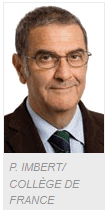|
News & Views item - October 2012 |
![]() What Has Made This Nobel Prize Possible? What Is Your Research Useful For? What
Would You Say to Decision-Makers. (October 18, 2012)
What Has Made This Nobel Prize Possible? What Is Your Research Useful For? What
Would You Say to Decision-Makers. (October 18, 2012)
 Those
are some of the questions Serge Haroche, co-winner of the 2012 Nobel Prize
in Physics was asked following the Tuesday announcement that he and David
Wineland had shared the prize for ground-breaking experimental methods that
enable measuring and manipulation of individual quantum systems.
Those
are some of the questions Serge Haroche, co-winner of the 2012 Nobel Prize
in Physics was asked following the Tuesday announcement that he and David
Wineland had shared the prize for ground-breaking experimental methods that
enable measuring and manipulation of individual quantum systems.
Came the week-end Professor Haroche had time to reflect and write a column for this week's Nature.
He notes that the research was initiated 35 year ago and that he and his colleagues "had exhilarating moments, when an expected phenomenon revealed itself. Equally, we had to deal with catastrophic equipment failures, correct the consequences of wrong decisions, and overcome seemingly insoluble technological difficulties." And they had some luck as well but mostly "our success has relied on the unique intellectual and material environment of the Kastler Brossel Laboratory at the Ecole Normale Supérieure (ENS) in Paris. There, I was able to gather a permanent research group of exceptional quality, transmitting expertise and knowledge accumulated over time to successive generations of bright students... Our experiments could only have succeeded with the reliable financial support provided by the institutions that govern our laboratory, supplemented by international agencies inside and outside Europe [and] my colleagues and I have retained the freedom to choose our path without having to justify it with the promise of possible applications.
Professor Haroche also emphasised the point that: "Unfortunately, the environment from which I benefited is less likely to be found by young scientists embarking on research now... the requirement to find scientific solutions to practical problems of health, energy and the environment, tend to favour short-term, goal-oriented projects over long-term basic research. Scientists have to describe in advance all their research steps, to detail milestones and to account for all changes in direction. This approach, if extended too far, is not only detrimental to curiosity-driven research. It is also counterproductive for applied research, as most practical devices come from breakthroughs in basic research and would never have been developed out of the blue."
And what reads as a note of despair by the 68-yer old: "I can only hope that [bright young scientists] will be granted similar opportunities to those that my co-prizewinner David Wineland (at the US National Institute of Standards and Technology) and I have been fortunate enough to experience: being free to choose their research goals and to manage their own efforts over the long term, and able to afford the pursuit of hazardous paths before seeing the light."